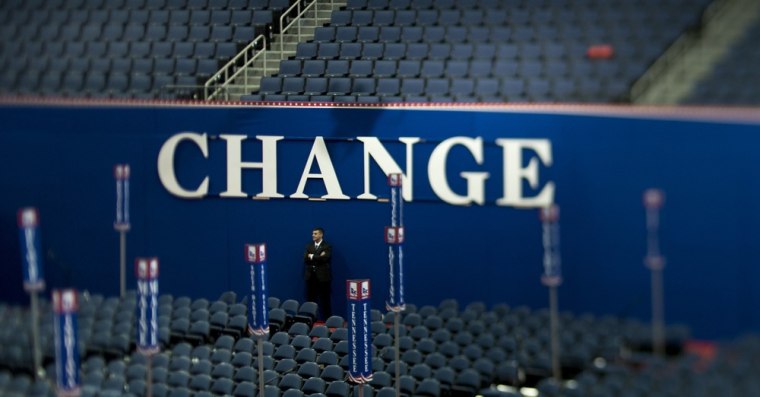Four years ago, Barack Obama centered his campaign around a message of change. With "Change we can believe in" as a campaign slogan, the Democratic presidential candidate positioned himself as a fresh alternative to the policies of the Bush administration. But if the two major party's 2012 platforms are any indication, Obama and the Democrats are no longer the party of change; rather, they now stand for continuity and modest adjustment. In 2012 it is the Republican platform which proposes the most sweeping transformations to American policy.
The 2012 Democratic Party Platform, released on Tuesday in advance of the party convention, emphasizes maintenance and stability. Popular welfare state programs such as Medicare and Social Security are to be preserved, and the economy's fragile, sluggish recovery is to be further nurtured. The platform includes deficit reduction as a major plank, emphasizing the Democrats' efforts to "restore fiscal responsibility to Washington."
The Democratic platform's philosophy of gradual growth stands in sharp contrast to its more ambitious Republican counterpart. As previously reported by Lean Forward, the GOP's 2012 version of their platform includes a plank calling for abortion to be outlawed in all circumstances, including rape and incest. (The Democratic platform simply voices support for the legal protections established by Roe v. Wade.) The platform also proposes putting "traditional Medicare in competition with private plans," echoing Paul Ryan's controversial proposal for a Medicare voucher program. The economy and jobs section of the platform even calls for a Balanced Budget Amendment, and an aggressive range of anti-labor union policies that could effectively end both public and private sector unions' already dwindling influence.
The Democratic platform does include some striking new proposals of its own. For example, it is the first platform by any major party to explicitly endorse marriage equality. However, the old outweighs the new on the Democratic side, in part because so much of the platform's text is an endorsement or defense of the incumbent president's policies. The phrase "We will continue to" recurs 44 times over the course of the document.
There are some points of overlap between the two platforms, most notably in their attempts to define the "American Dream." Whereas Republicans say they stand for a country where "any American who works hard, dreams big and follows the rules can achieve anything he or she wants," Democrats write that they intend to "[restore] for everyone who works hard and plays by the rules the opportunity to find a job that pays the bills, turn an idea into a profitable business, care for your family, afford a home you call your own and health care you can count on, retire with dignity and respect, and, most of all, give your children the kind of education that allows them to dream even bigger and go even further than you ever imagined."
